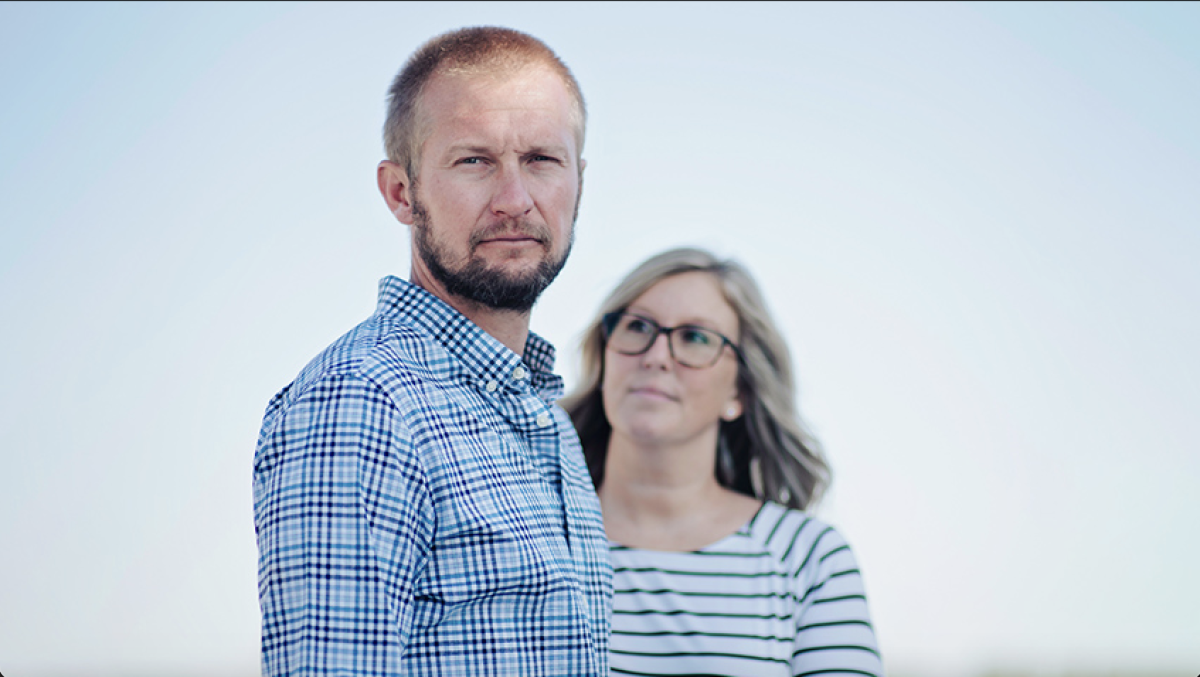KABUL, Afghanistan – A voice cracked through the line, low and urgent as the Taliban was taking the city. An Afghan interpreter was calling an Oklahoma area code from a dim safehouse tucked between crumbling walls in Kabul. It was August 2021, only days until the city fell.
On the other end, Marine veteran David Owens could hear children crying and the sharp edge of panic in the interpreter’s voice. The interpreter who once kept him safe was now hiding in a basement in search of refuge. Owens said all he could think about was him and his family in that position- being actively hunted.
Half a world away, in Edmond, Oklahoma, Owens listened to the man who had once walked the mountains of Afghanistan. He was a man who had de-escalated fights, navigated hostile villages and saved American lives. Now, the interpreter, who we are not naming to protect his safety, was a target of the Taliban’s door-to-door hunts.
Oklahoma is a state with both veterans who deeply care about Afghans and politicians who, at times, stoke anti-immigrant fear. It’s considered about deep relationships forged in war, the legacy of U.S. foreign policy and how Islamophobia and patriotism intersect- especially in red states.
Now many face that paradox of caring and a climate of suspicion and policies that threaten the protections they were promised. Provisions in the “Big, Beautiful Bill” that passed Congress last month create expensive new fees for asylum, humanitarian parole and temporary protected status, while making applicants ineligible for social services such as health care and food benefits upon other policy challenges.
Owens served as a Marine Corps corporal while in Afghanistan. A highly decorated veteran, Owens was part of Fox Company and the elite Scout Sniper Platoon from 2002 to 2005, serving with the 2nd Battalion, 1st Marines and later with the 143rd Infantry Regiment of the Army National Guard.
His awards include the Combat Action Ribbon, the Afghanistan Campaign Medal with Campaign Star, the Army Commendation Medal, and the Navy and Marine Corps Presidential Unit Citation, the Terrorism Service Medal, upon other National Defense Service Medals. He also received the Iraq Campaign Medal, the Armed Forces Expeditionary Medal, the Global War on Terrorism Service and Expeditionary Medals, the NATO Medal, the Overseas Service Ribbon and the Armed Forces Reserve Medal.
Transitioning from combat to diplomacy, Owens was working at the State Department in Kabul in 2008, where his path crossed with the interpreter’s. The two worked alongside each other for the next five years.
The Owens’ efforts to bring his interpreter home were dubbed a “Digital Dunkirk.” A network of veterans, scattered across the U.S., scrambling to pull former allies out of the chaos where their past service marked them for death. Owens was one of them- guiding his interpreter’s family out by phone, text and sheer will.
The veterans formed a digital lifeline- stretched across the country, from Colorado to California to Oklahoma. Through messaging chats, contacting congressmen and frantic Facebook messages, former Marines coordinated precise extractions.
The interpreter had 20 minutes to reach the airport- the “longest twenty minutes” of the Owens’ life- to risk everything. David paced his home while his wife Meagan sat frozen, eyes locked on their phones, praying that a stranger on the ground would keep the promise they couldn’t reach across oceans to fulfill. With a connection eventually made on the ground in Afghanistan, the extract of the interpreter was done.
“Thank you brother, thank you sister, we’re safe now,” the interpreter muttered from a safehouse. In Edmond, tears and hugs of embrace followed.
Owens’ name and number marked the interpreters’ children’s clothing on their way to the states.
But now, four years later, their safety may have an expiration date.
In June, Oklahoma Attorney General Gentner Drummond, who is running for governor, issued a public call for the removal of all Afghan refugees from the state, echoing President Trump’s January proclamation banning Afghan nationals from U.S. entry. Drummond claimed those already here were “poorly vetted” and posed a “security threat.” And for many Oklahoma veterans, it’s personal.
Meagan called these statements fear mongering to an extent. While they can only speak for the interpreter, not others in Afghan removal, she added, “I hope the Attorney General is investigating the people they’re calling unsafe… it’s out of fear, lack of knowledge and ignorance without knowing the people overseas.”
There are several Oklahoma based veteran advocacy groups that say the Afghans were key allies to the U.S. One veteran told The Oklahoman many others share his outrage over Drummond’s demand that Afghan refugees must go because “one, we made promises and second, they (veterans) owe their lives to these folks and they (refugees) deserve to be here.”
During the post-9/11 stay in Afghanistan, hundreds of thousands of Afghans were hired as interpreters, drivers, engineers, security guards and allies- risking their lives to help U.S. troops. Afghan interpreters were often cast as Muslim allies. But some believe they became politically inconvenient- and in many ways, abandoned.
“I couldn’t imagine someone who earns and deserves to come to the U.S. more than him,” Owens said. He said he has him to thank for de-escalating situations as an Afghan but also a U.S. soldier.
Oklahoma has received one of the largest groups of Afghan refugees in the U.S. since the withdrawal in 2021, mostly in Oklahoma City and Tulsa. Around 76,000 Afghans were resettled across the U.S., triggering the evacuation of around 1,800 Afghan refugees to Oklahoma under humanitarian parole. Churches, veterans and nonprofits welcomed many but right-wing politicians and commentators began to push anti-refugee rhetoric. Drummond criticized Gov. Kevin Stitt for welcoming this amount of Afghan refugees to Oklahoma.
“We’re just doing what’s right,” Meagan Owens said.
Her former Marine husband said there is an extreme process of government vetting for parolees in the interpreters position, She added that an ignorant way of thinking is to “blanket approach” the whole nationality.
In all the years he spent there, David Owens remembers, “Afghans are just regular people. There were no extremist sides, or judgement due to religious reasons…they were very welcoming.”
“Just like us, there’s bad and good apples,” he added.
In April, the Department of Homeland Security announced that it would not renew the temporary protected status that shields Afghans from deportation. The following month, the State Department notified Congress it was shutting down the office that coordinates continuing relocation efforts for Afghans.
The interpreter’s story mirrors that of the Vietnamese boat people- displaced by war, hunted by a new regime, and forced to seek refuge after U.S. withdrawal left them vulnerable. Many of those refugees settled in Oklahoma City.
The interpreter and his flight settled in Atlanta, with a government screened apartment and joined by his family. The Owens put together a donation drive for the family to help them get on their feet.
One of his kids just graduated kindergarten.
The Owens’ are still receiving messages from Afghans asking for help, but they do not have the on the ground resources they once did. While they are unsure of their current legal status, a trusted point of contact said that he was undergoing the process.
Members of The Springs Church of Christ also in Edmond, Oklahoma saw an opportunity to help through their church’s resettlement assistance program and are still actively helping Afghan women through English lessons and friendship.
“It’s a death sentence to be sent back,” Meagan Owens said. As far as the interpreter, she added that “there is no other option than to just keep him here.”
Gaylord News is a reporting project of the University of Oklahoma Gaylord College of Journalism and Mass Communication. For more stories by Gaylord News go to GaylordNews.net.


